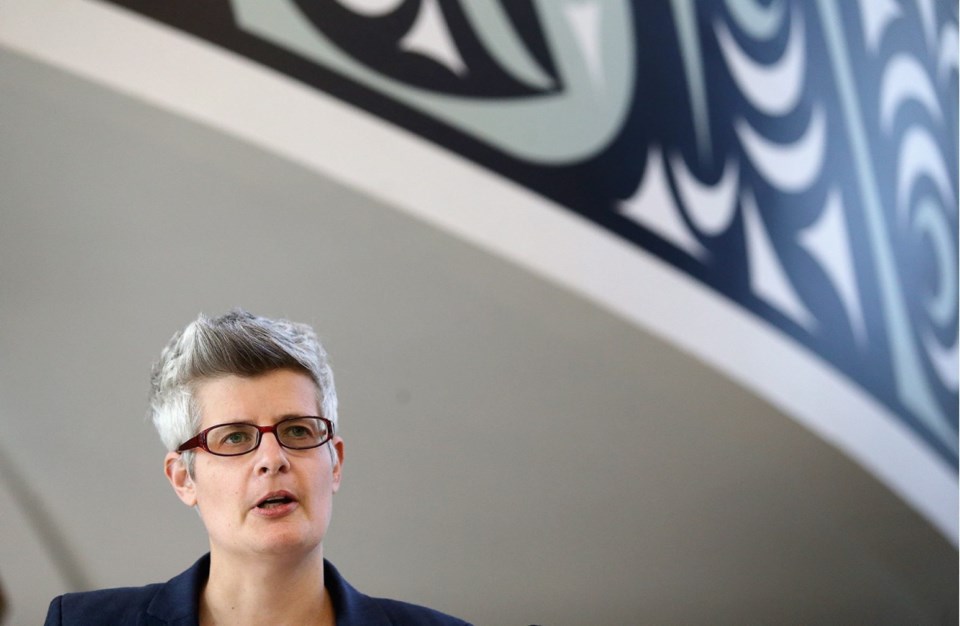Victoria will have cash-flow issues to deal with after the B.C. government announced a series of tax-relief measures for businesses Thursday.
But Mayor Lisa Helps said the city is up for the challenge and will do its part to make it work.
“We’re all in this together and, because this is a positive announcement today for business, the city’s going to do what it can to support this important initiative in any way that we can,” she said.
Finance Minister Carole James announced that in order to give businesses and landlords more time to pay commercial property taxes, the late payment date has been extended to Oct. 1, from July.
She said most commercial property tax bills will be cut by a further 25 per cent with a second reduction in school property tax payments, which have already been chopped by 50 per cent.
“While the municipal deadline for property taxes remains the same, most in July, we’re delaying the late payments for businesses in every community until October,” James said. “Businesses have told us they need this room and we’ve responded.”
She said the school tax reduction will cut overall property taxes for businesses by 25 per cent.
Helps said the delayed tax payments will have a significant impact on Victoria, which receives 50 per cent of its tax revenue from the business community.
“We’re going to have to manage our cash flow a little different than we had planned between August and October,” she said.
That challenge, however, will be partially offset by measures designed to help local governments.
Housing Minister Selina Robinson said local governments will be able to borrow interest-free from their reserve funds and carry debt into next year to help them deal with immediate financial pressures. As well, municipalities will be able to hold on to the school taxes they collect for the province until the end of the year.
“I speak weekly with every local government in B.C. right now and I’ve heard first-hand the real pressures this crisis has placed on resources and people in their communities,” Robinson told a news conference.
“This framework is designed as a first step, immediate relief to help communities to manage cash-flow pressures so they can continue to deliver the services that people count on.”
Colwood Mayor Rob Martin said delaying the school tax remittance to the end of the year will help the city’s cash flow.
But, like Helps, he expressed the most appreciation for the additional assistance provided the business community.
“The additional steps for commercial taxpayers regarding the tax reduction and deferral dates are certainly beneficial for Colwood,” he said. “We definitely see that as being a large positive for our business community. It’s another step on assisting them in their survival.”
Vancouver’s mayor, meanwhile, said the community relief measures will not be enough to prevent city layoffs and service cuts.
Kennedy Stewart said in a statement that James and Robinson deserve some thanks for announcing initial steps, but they won’t make up for lost operating revenue or potential property-tax defaults.
“Like other cities, Vancouver has already started adjusting to the new reality by shuttering many services, laying off 10 per cent of our workforce and reducing the pay of management and other exempt staff by 10 per cent.”
Stewart said he will ask council to approve a 10 per cent cut to his own salary.
Helps said Victoria isn’t contemplating layoffs beyond the 163 auxiliary and on-call staff who have been told there is no work for them at present.
“At this point, we don’t anticipate any more changes will need to be made, unless in August, we see that residential taxpayers can’t pay their taxes, but again, we’re not anticipating that.”
Martin said Colwood isn’t planning any layoffs, either. “And that is because we’re having our staff really focus on how do we be successful economically in the future,” he said. “And the staff are doing the pre-work right now to make sure that that happens when we come out of this.”
Union of B.C. Municipalities president Maja Tait, who is also the mayor of Sooke, said in a statement the measures provide additional assistance to small businesses and free up funds for local government.
“UBCM will monitor the impact of these measures on the state of local governments’ finances and work with the province to ensure that local governments have the resources to sustain their communities,” she said.
— Times Colonist and The Canadian Press



